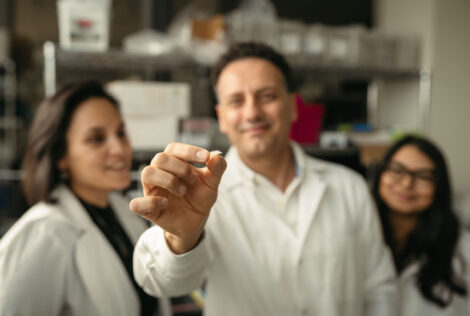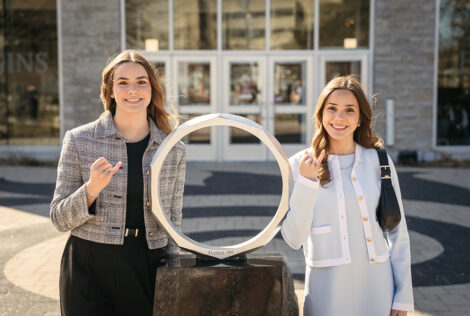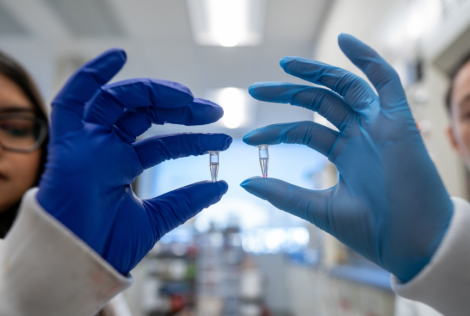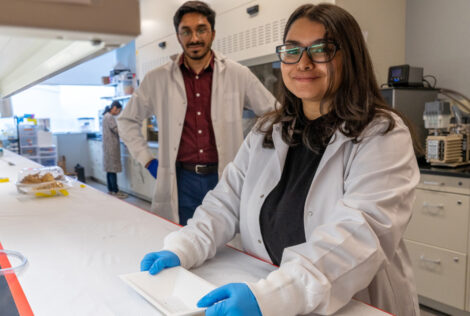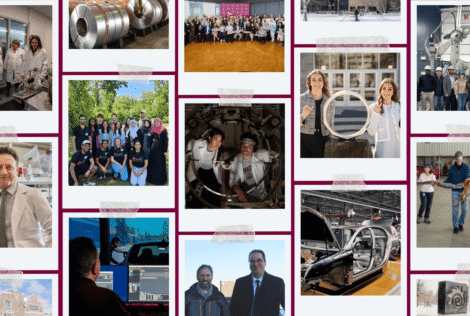
Expertise
Areas of Specialization
Research Clusters
Current status
-
Accepting graduate students
-
Associate Dean, Research, Innovation and Partnerships
Faculty of Engineering
-
Professor
Chemical Engineering
-
Associate Member
McMaster School of Biomedical Engineering
Overview
Our research group is driven to develop simple and low-cost technologies that contribute towards creating a healthier society. This requires highly collaborative research: we work closely with colleagues from Biochemistry, Chemistry, Immunology, Mechanical Engineering and Chemical Engineering. Our efforts are focused on two main areas:
Create easy-to-use and equipment free biosensors. We have developed paper-based and flexible plastic (food wrap) sensors that detect the presence of specific pathogenic bacteria in water, food and other complex biological matrices (including fecal matter). This work is done in collaboration with the Li, Brennan, Pelton and Didar
Create methods and techniques to thermally stabilize biological materials. We have developed a simple technique to provide long term (months) thermal stability to a wide range of reagents, including various enzymes, oxygen sensitive organic molecules, RNA, phage and, recently, vaccines. The ability to ship enzymes across the world without the need to maintain a cold-chain distribution can have a great influence on global health, since the cost of vaccination campaigns would be drastically reduced. This work is done in collaboration with the Doust, Miller and Ashkar
B.Sc. Catholic Portuguese University (1993)
PhD. Clemson University (1999)
Vincent Leung, Jonathan Mapletoft, Ali Zhang, Amanda Lee, Fatemeh Vahedi, Marianne Chew, Alexandra Szewczyk, Sana Jahanshahi-Anbuhi, Jann Ang, Braeden Cowbrough, Matthew S Miller, Ali Ashkar, Carlos DM Filipe
Thermal Stabilization of Viral Vaccines in Low-Cost Sugar Films
SCIENTIFIC REPORTS
Most currently available vaccines, particularly live vaccines, require the cold chain, as vaccine efficacy can be significantly hampered if they are not stored in a temperature range of 2–8 C at all times.
Vincent Leung, Meredith Brooks, Sophia Emerson, Monsur Ali, Carlos DM Filipe
Ready‐to‐use thermally stable mastermix pills for molecular biology applications
BIOTECHNOLOGY PROGRESS
Rolling circle amplification (RCA), polymerase chain reaction (PCR), and loop‐mediated isothermal amplification (LAMP), are powerful tools that can be used for gene manipulation, pathogen detection, and infectious disease diagnostics.
Hanie Yousefi, M Monsur Ali, Hsuan-Ming Su, Carlos DM Filipe, Tohid F Didar
Sentinel wraps: Real-time monitoring of food contamination by printing dnazyme probes on food packaging
ACS NANO
Here, we report the development of a transparent, durable, and flexible sensing surface that generates a fluorescence signal in the presence of a specific target bacterium.
Clémence Sicard, Chad Glen, Brandon Aubie, Dan Wallace, Sana Jahanshahi-Anbuhi, Kevin Pennings, Glen T Daigger, Robert Pelton, John D Brennan, Carlos DM Filipe
Tools for water quality monitoring and mapping using paper-based sensors and cell phones
WATER RESEARCH
In this paper we describe a combination of paper-based sensors and a novel smart-phone application for on-site quantification of colorimetric readouts as an ultra-low cost solution to monitoring water quality.
Sana Jahanshahi‐Anbuhi, Kevin Pennings, Vincent Leung, Meng Liu, Carmen Carrasquilla, Balamurali Kannan, Yingfu Li, Robert Pelton, John D Brennan, Carlos DM Filipe
Pullulan encapsulation of labile biomolecules to give stable bioassay tablets
ANGEWANDTE CHEMIE INTERNATIONAL EDITION
A simple and inexpensive method is reported for the long‐term stabilization of enzymes and other unstable reagents in premeasured quantities in water‐soluble tablets (cast, not compressed) made with pullulan, a nonionic polysaccharide that forms an oxygen
Yaqin Xu, Zhuyuan Zhang, M Monsur Ali, Joanna Sauder, Xudong Deng, Karen Giang, Sergio D Aguirre, Robert Pelton, Yingfu Li, Carlos DM Filipe
Turning Tryptophanase into Odor‐Generating Biosensors
ANGEWANDTE CHEMIE
An odor‐based sensor system that exploits the metabolic enzyme tryptophanase (TPase) as the key component is reported.






